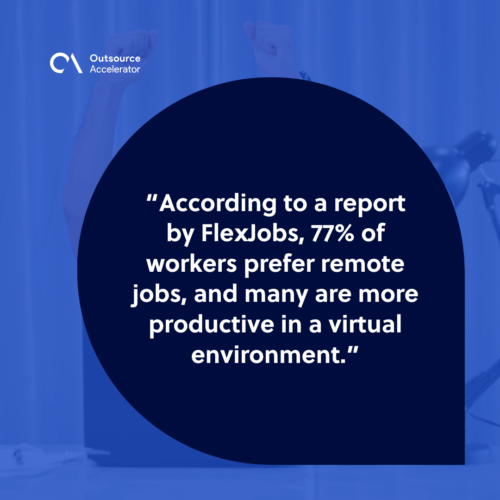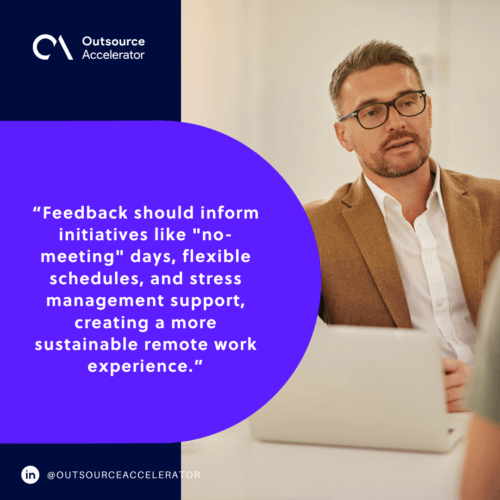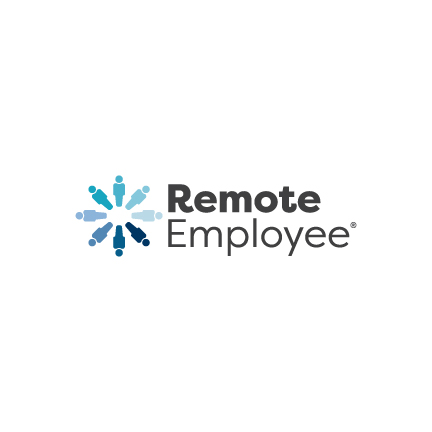5 Remote employee engagement questions to strengthen virtual work culture

Strengthen virtual work culture: 5 remote employee engagement questions
Hiring a virtual team comes with its unique set of challenges. The absence of employees’ physical presence can make it difficult for leaders to foster a stable, productive, and harmonious work environment.
Communication barriers, feelings of isolation, and a lack of cohesion are just a few issues that may arise. It’s up to management to actively create a culture that promotes collaboration, support, and trust despite the physical distance.
One effective way to do this is by asking the right remote employee engagement questions.
In this article, we’ll highlight five questions that businesses can use to strengthen their offshore teams and improve overall team dynamics.
What to expect when working with remote employees
As remote work continues to grow, businesses must adjust to the dynamics of managing virtual teams.
Remote Employee CEO Ruffy Galang notes that “expectations from employees across all regions are relatively similar, what differs is how people feel their employers should deliver upon these expectations.”
According to a report by FlexJobs, 77% of workers prefer remote jobs, and many are more productive in a virtual environment. However, working with remote employees requires careful attention to various factors.

When working with remote employees, businesses can expect:
- Communication challenges. Without face-to-face interaction, miscommunication can occur. Clear and consistent communication channels are essential for success.
- Time zone differences. Coordinating schedules across multiple time zones can be tricky. It requires flexibility and planning to align work hours.
- Accountability. Remote workers must be self-motivated. It’s important for managers to clearly define what work needs to be done and how often they’ll connect with their team.
- Technology dependence. Smooth operation relies on the right tools and platforms. Regular updates and reliable internet access are crucial.Isolation. Remote employees may feel disconnected from the team. Meeting online regularly is a good way to keep up a feeling of togetherness among the team.
Adapting to these aspects will help businesses create a more cohesive remote work environment.
5 Remote employee engagement questions for your virtual team
Maintaining a strong connection with remote employees can be difficult, but asking the right questions can foster engagement and strengthen the virtual team dynamic.
Here are five key remote employee engagement questions that can help businesses improve their virtual work culture:
1. How are you feeling about your current workload?
This question allows employees to share workload concerns, both overload and underload. We need to consider not only the amount of work, but also how well it’s being done.
Remote work can blur boundaries, so it’s vital to check for burnout and stress.
Also, are employees feeling underutilized? Responses help managers adjust task distribution, project priorities, and team resources.
Regular workload check-ins are crucial for a healthy and productive remote team.
2. Do you feel supported by the team and leadership?
As mentioned, there’s a common phenomenon of remote workers feeling isolated. This question gauges their sense of connection and belonging.
Do they feel comfortable seeking help, and are their contributions valued? Negative responses require attention.
Are there communication gaps due to differing time zones? Is leadership providing adequate guidance and recognition?
Proactive strategies like virtual team-building and clear communication are key to fostering a supportive remote environment.
3. What can we do to help you improve your work-life balance?
Work-life balance is essential, especially remotely. This question shows care for employee well-being and invites feedback.
Are employees struggling to disconnect? Do they need flexible hours? Would wellness resources help?
Feedback should inform initiatives like “no-meeting” days, flexible schedules, and stress management support, creating a more sustainable remote work experience.
4. Are the tools and technology we provide meeting your needs?
Technology is crucial, being the backbone of remote work. This question assesses tool effectiveness.
Are they reliable and user-friendly? Are there technical issues?
Feedback helps identify necessary improvements or updates. Investing in the right technology and providing adequate support is vital for remote productivity.
5. motivates you to do your best work?
Perhaps unsurprisingly, motivation drives engagement. Although pay plays a role, this inquiry looks at additional internal and external motivators.
Is it purpose, growth, or recognition? This knowledge allows managers to give each person the right kind of support and build a remote work atmosphere that’s both positive and effective.

Partner with Remote Employee for top-tier virtual specialists
Remote Employee connects you with highly skilled professionals capable of elevating your workforce performance across various functions. The firm goes beyond simple placement; it focuses on understanding your organization’s specific needs and providing tailored talent solutions that drive efficiency and growth.
Its approach emphasizes seamless integration, ensuring that virtual specialists work collaboratively with your existing staff, maintaining your company culture and productivity.
Remote Employee handles the complexities of remote management. These include recruitment, onboarding, payroll, and ongoing support, allowing you to concentrate on your core business.
For companies looking to build a stronger, more efficient virtual workforce, get in touch with Remote Employee today to get started!







 Independent
Independent




